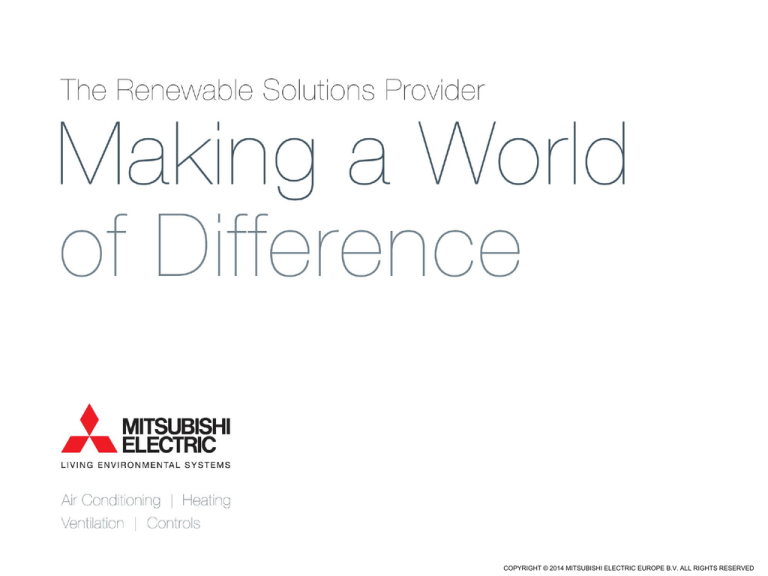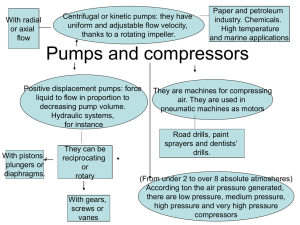
COPYRIGHT © 2014 MITSUBISHI ELECTRIC EUROPE B.V. ALL RIGHTS RESERVED
Mitsubishi Electric Guide to the London Plan
Presented by:
COPYRIGHT © 2014 MITSUBISHI ELECTRIC EUROPE B.V. ALL RIGHTS RESERVED
Why a special plan?
•
•
•
•
•
Europe’s biggest city
1,572 sq. km
7.56 million people
Forecast to grow to 10 million by 2031
Plan for integrated framework
Six key objectives
1) Meet the challenges of growth sustainably
2) Create a globally competitive city
3) Diverse and strong community
4) Great buildings and architecture
5) World leader in supporting the environment
6) City that is accessible via good public transport
About the plan
•
•
•
•
•
121 policies
Over 300 pages
Updated end of 2013
Ensures joined-up policy
All Boroughs must adhere to it
The plan and construction
•
•
•
•
Background to all planning
Sustainable development is central theme
Mitigating effects of climate change
Lifting people out of fuel poverty
London and climate change
UK capital is vulnerable to climate change, through:
•
•
•
•
Flooding
Subsidence
Water shortages
Overheating
All are more likely to happen….
The City – good and bad for the environment
•
•
•
•
167 litres of water per person, per day
Energy demand growing
More public transport use
Lower carbon emissions
GLA targets
•
•
•
•
Reducing carbon and emissions
Improve energy efficiency of London’s homes
60% reduction in CO2 by 2025
Deliver 25% energy from decentralised
sources by 2025
Lean, clean and green
Development Plan Documents (DPDs)
1. Does the proposal use less energy by adopting
sustainable design and construction measures?
2. Does the proposal use an efficient energy supply, with
particular emphasis on de-centralised energy generation?
3. Does the proposal use renewable energy?
Other important factors
•
•
•
•
•
Effective adaptation
Minimise overheating
Reduce heat island effect
Minimise solar gain and water use
Reduce flood risk
Energy in the Plan
•
•
•
•
Energy assessment
How CO2 targets will be met?
40% improvement on Part L 2010
2019 – non-domestic zero carbon buildings
Existing stock – the main factor
• RE-FIT scheme – Retrofitting existing public sector
building stock
• 40% refitted by 2025
• 11 million m2
• Save 2.5 million tonnes of carbon per year
London homes
•
•
•
•
RE-NEW for homes
Maximise funding from the Green Deal
Maximise funding from ECO
Energy saving investments
New approaches to heating
•
•
•
•
No single solution to London’s challenges
Mayor supports innovative approaches
Renewables must be considered for projects
Heat pumps, photovoltaics, solar hot water
Decentralised energy and Secondary heat
Decentralised energy: by 2030 almost 25% London’s
heat could be locally generated
Secondary heat sources: Waste heat from industrial
and commercial activities. Naturally occurring heat in
the air, ground & water
The potential of heat pumps
•
•
•
•
Waste heat not uniform
Need to lift temperatures
Heat pumps could achieve this
Heat pumps proven technology – 25,000 homes
A vision of low-carbon heating
• London in 2050
• Move away from fossil fuels
• Secondary heat sources in the city centre
and outskirts
• Heat pumps important technology
• Variety of capacities to suit
Using a range of available heat
• Heat pumps access heat from air, water and ground
• Need to invest in building stock
• Improve energy performance then
use renewables
• Heat pumps can do a lot to support
the London Plan
Movement of heat
• Movement of heat between buildings through low
temperature heat loops
• Opportunities for heating and cooling
• Heat not lost – re-used
• Higher temperature waste heat or loops can
interact with low temperature loops
• Vital to realising change
Case study for London
•
•
•
•
•
Kingston Heights
£70 million mixed use development
Former power station next to the River Thames
56 affordable homes
81 luxury apartments
Using Heat from the river
• All homes benefit from cutting-edge
heat pump system
• Harvests naturally stored energy from
the River Thames
• Community heating scheme based on
heat pump technology
Thank you, any
questions?












